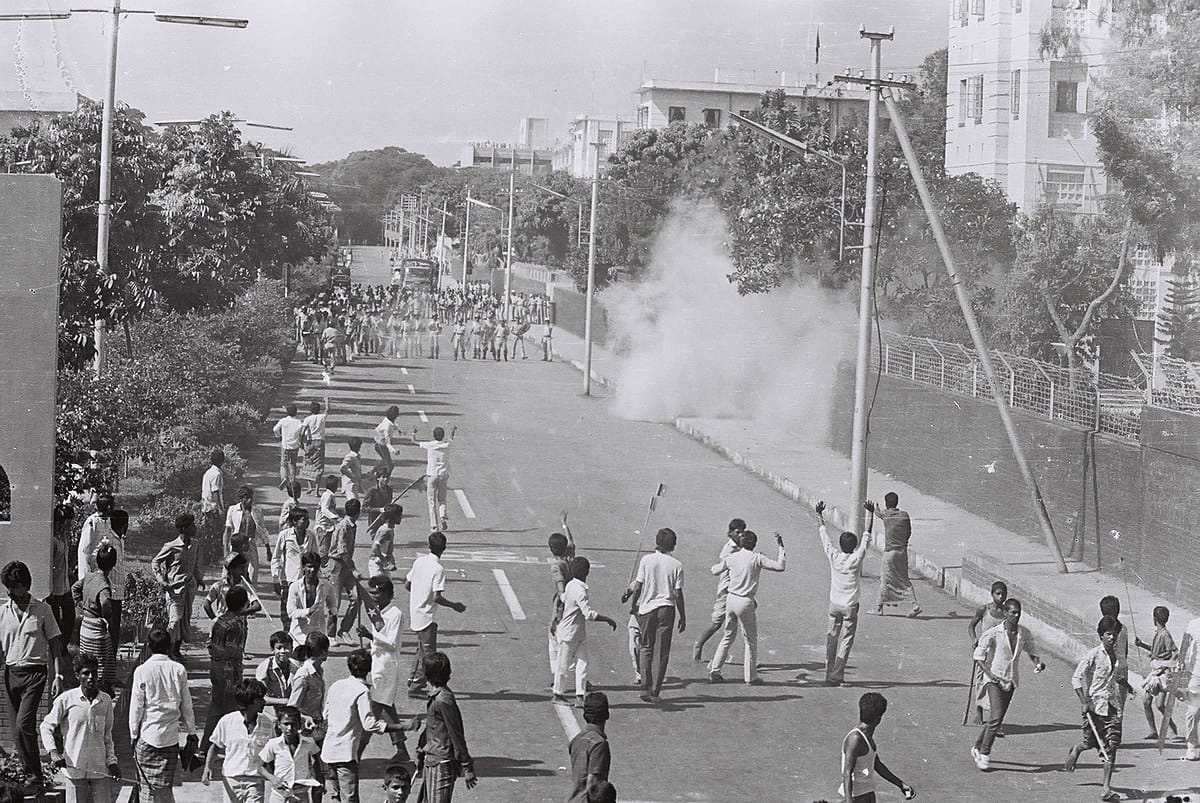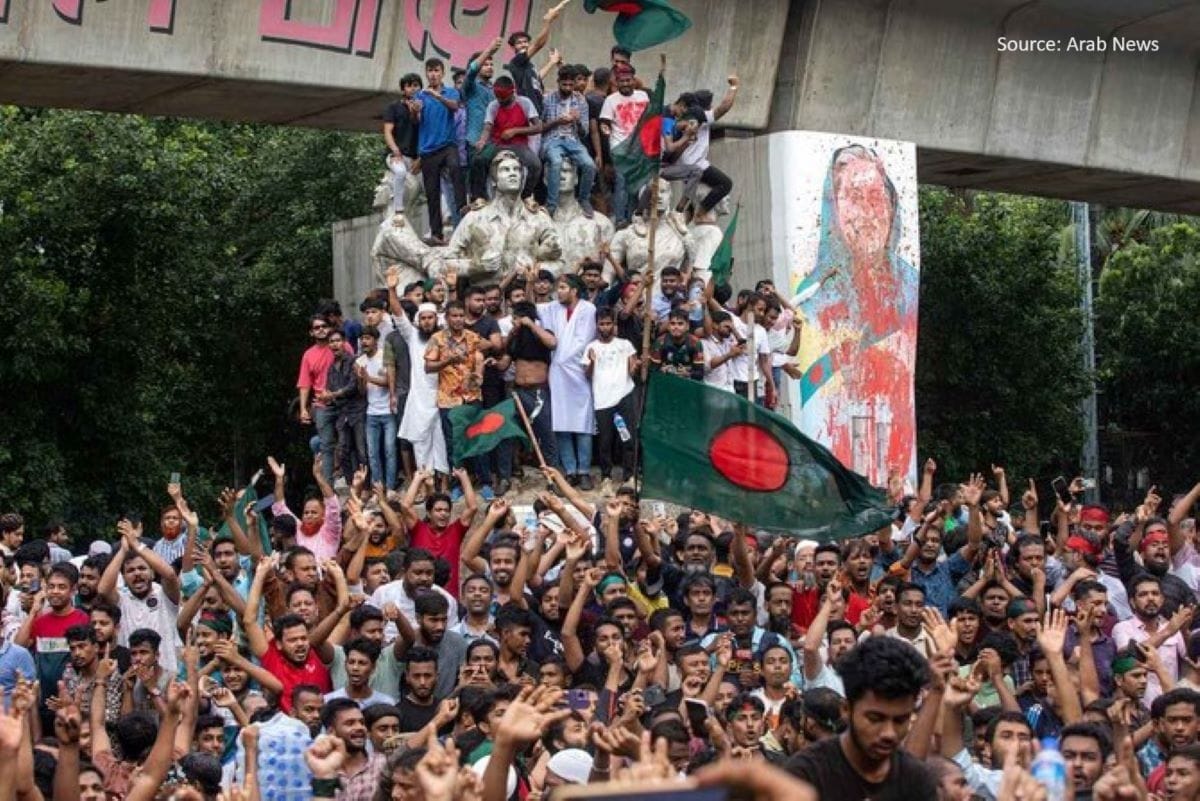Bangladesh faces significant political unrest, with widespread protests against Prime Minister Sheikh Hasina’s government. This turmoil is deeply rooted in the nation’s complex history, marked by past coup attempts and ongoing political challenges. The unrest has not only stirred concerns within the country but also has broader implications for neighboring countries like India and global powers such as the United States. Understanding the current situation requires looking at the historical context and the potential impact on the region’s future stability.

A Quick Look at Bangladesh’s History
Bangladesh has a rich and complex history that helps explain the current unrest. The country became independent from Pakistan in 1971 after a tough liberation war, driven by long-standing cultural and economic oppression. The Bengali people’s unique identity was often overlooked by the Pakistani government, leading to significant conflict.
Since independence, Bangladesh has faced various challenges, including political instability, multiple coup attempts, and ongoing struggles for democratic governance. The Awami League, led by Sheikh Hasina, has been a dominant political force since the early 1990s. Hasina’s tenure, especially since she became Prime Minister again in 2009, has been marked by accusations of authoritarianism, which have fueled recent protests and riots demanding fair elections.
The country has seen several coup attempts over the years, often due to power struggles and dissatisfaction among military or political groups. Today, speculations suggest that various factions, including opposition parties, foreign influences, and possibly disgruntled military officials, may be behind the current unrest.
The impact of these events extends beyond Bangladesh. Neighboring countries like India are concerned about the potential for increased instability and refugee flows, while global powers like the United States are closely monitoring the situation due to its implications for regional security and economic interests.
As protests and riots continue, the international community’s response could include sanctions or diplomatic pressure if the situation worsens. Bangladesh’s ability to handle this unrest will be crucial in determining its future stability and democratic progress. The coming months will be important in shaping whether the nation can move towards a more peaceful and democratic future.
What’s Happening Now in Bangladesh?
Bangladesh is currently experiencing a surge in protests, with citizens expressing growing dissatisfaction with the government led by Prime Minister Sheikh Hasina. The situation has escalated to significant unrest, marked by violence and clashes between protesters and police. These protests, driven by frustrations over corruption, rising prices, and allegations of government oppression, have drawn international attention.
Since its independence from Pakistan in 1971, Bangladesh has faced numerous political challenges, including military coups and power struggles between major political parties. The current unrest seems to be a continuation of these historical tensions, with concerns that the instability could lead to further conflict. Speculation about potential conspirators behind the unrest includes political rivals and external forces who may benefit from destabilizing the current government.
The implications of the unrest extend beyond Bangladesh’s borders, with neighboring India and the United States closely watching the developments. India is concerned about regional stability and potential migration issues, while the U.S. is focused on the impact on its diplomatic relations with Bangladesh.
As the situation continues to unfold, the future of Bangladesh remains uncertain. The possibility of further protests looms, and without meaningful dialogue between the government and the opposition, the potential for increased instability is high. International observers are calling for restraint and peaceful resolutions, as the world waits to see how this critical moment in Bangladesh’s history will play out.
A History of Political Instability
Bangladesh has faced ongoing political unrest since its independence in 1971. The country’s journey from a brutal war for independence against Pakistan to its present-day challenges is marked by periods of authoritarian rule, military coups, and deep political rivalries. These issues have contributed to a history of instability, with the current unrest being the latest manifestation of long-standing tensions.
The rivalry between Prime Minister Sheikh Hasina’s Awami League and the opposition, mainly the Bangladesh Nationalist Party (BNP), has fueled much of the turmoil. Allegations of corruption, election manipulation, and suppression of dissent have led to widespread frustration among the population, resulting in protests and riots in major cities. Many think that outside forces and rival political groups are causing the unrest, which worries neighboring countries including India.
As Bangladesh navigates this critical period, the future remains uncertain. Without meaningful reforms and a commitment to addressing the root causes of the unrest, the cycle of instability may continue. The international community is closely watching, hoping for a peaceful resolution that respects the democratic aspirations of the Bangladeshi people.
Who Might Be Behind the Current Unrest?
The recent protests and riots in Bangladesh reflect widespread frustration with the government, particularly towards Prime Minister Sheikh Hasina. While the immediate cause of the unrest is linked to her controversial policies, the deeper reasons are rooted in a long history of political instability, economic challenges, and social discontent.
Since gaining independence in 1971, Bangladesh has faced several military coups and periods of authoritarian rule. The political rivalry between Sheikh Hasina’s Awami League and the opposition, primarily the Bangladesh Nationalist Party (BNP), has intensified these challenges, fueling public anger and leading to the current wave of protests.
Analysts believe that opposition groups, especially the BNP, could be using this discontent to regain political influence. Economic hardships, worsened by the COVID-19 pandemic, have only added to the unrest. There’s also speculation about the involvement of external influences, as Bangladesh’s instability could impact regional security, particularly concerning neighboring countries like India.
As violence escalates and international attention grows, the future of Bangladesh remains uncertain. The outcome will likely depend on how the government, opposition, and other stakeholders choose to address the underlying issues driving the unrest. The world is closely watching, as the situation in Bangladesh could have significant implications for the entire region.
How This Affects the Region
The recent unrest in Bangladesh has raised serious concerns across South Asia, affecting not just the country’s internal stability but also its relationships with neighboring nations and global powers. The ongoing protests, sparked by concerns over electoral fairness and demands for democratic reforms, have escalated into widespread unrest, drawing significant attention to Prime Minister Sheikh Hasina’s government. Critics argue that the government’s response to the dissent is only making the situation worse.
Bangladesh has a history of political instability, from its war of independence in 1971 to various coup attempts aimed at reshaping the country’s political landscape. These past events were often driven by power struggles, economic issues, and external influences, and these same factors seem to be at play today. Some believe that Islamist groups and opposition parties may be key players in stirring up the current unrest.
The impact of this turmoil extends beyond Bangladesh’s borders, particularly affecting its relationship with India, which has a strong interest in a stable Bangladesh. Increased instability could lead to tensions along their shared border, possibly resulting in a surge of refugees, which would pose significant challenges. Additionally, the United States is also concerned, as Bangladesh’s strategic position in South Asia and its growing economic importance make stability in the region a priority.
As the situation in Bangladesh intensifies, the international community is watching closely. How this unrest is resolved—or if it continues to worsen—could have a major impact on regional security, trade, and humanitarian efforts.
For Bangladesh, the future is uncertain. Ongoing violence could damage the country’s economic prospects and isolate it further on the world stage. However, if meaningful dialogue can take place, there may be a chance for reforms that strengthen democratic institutions and improve the lives of citizens.
What the Media Is Saying
The recent unrest in Bangladesh has drawn significant attention from both local and international media. The ongoing protests, triggered by allegations of political oppression and increasing authoritarianism under Prime Minister Sheikh Hasina, have sparked widespread concern. Many reports are highlighting Bangladesh’s complex history, which includes its 1971 independence and various political upheavals.
Media outlets are closely watching as the situation develops, with some speculating about the after results of the coup attempts, similar to those in Bangladesh’s past.
Recent reports indicate that the government has responded to the protests with force, drawing international criticism. There are increasing calls for the government to listen to its people and return to democratic norms. The future of Bangladesh remains uncertain, and the coming days will be crucial in determining whether the country can find a peaceful resolution or if the unrest will continue.
As the situation unfolds, the world is watching closely, anxious to see what will happen next in Bangladesh and how it will affect the region.
What’s Next for Bangladesh?
As Bangladesh faces significant unrest and widespread protests, many are asking what lies ahead for the nation. The current turmoil is deeply rooted in the country’s complex history, which includes struggles for independence and challenges in building a stable government. Since gaining independence from Pakistan in 1971, Bangladesh has experienced several coup attempts and political upheavals.
Prime Minister Sheikh Hasina’s government was under intense scrutiny due to allegations of electoral fraud and suppression of dissent. Recent protests have turned into violent riots in major cities, driven by frustrations over rising inflation, corruption, and authoritarian practices. The current unrest echoes past struggles for democratic rights and justice.
Speculation about who might be behind the unrest includes political opponents, dissatisfied segments of the population, and possibly international actors. International observers and media are closely monitoring the situation, calling for peaceful resolution and dialogue.
The future of Bangladesh hinges on whether the government can address the people’s grievances and restore stability. The coming months will be crucial in determining if the nation can overcome its current challenges and build a more inclusive democracy.
Read more about current global updates: UK Elections, Kamala Harris, Appollo 11, Melania Trump
More updates on Bangladesh Coups
Final Thoughts
As Bangladesh experiences significant unrest and protests, it’s important to understand the historical context and implications of the current situation. Since gaining independence from Pakistan in 1971, Bangladesh has faced political instability, economic challenges, and struggles with democratic governance. The ongoing unrest, driven by dissatisfaction with Prime Minister Sheikh Hasina’s government, raised questions about the nation’s future.
Recent protests have erupted over allegations of electoral fraud and suppression of dissent, with demonstrators calling for political reform and greater accountability. Riots in major cities have led to fear and uncertainty among citizens, who are increasingly frustrated with what they see as authoritarian practices and restricted freedoms.
Bangladesh has a history of political volatility, including coup attempts and power struggles, often involving military or political rivals. Speculation about who might be behind the current unrest includes disillusioned political factions, dissatisfied citizens, and possibly external influences seeking to exploit the situation.
The impact of the unrest extends beyond Bangladesh, affecting relationships with key players like the United States and India. Both countries have interests in a stable Bangladesh due to regional security and economic factors. Further deterioration could lead to increased international scrutiny and intervention.
Looking ahead, Bangladesh faces a challenging path. Addressing public grievances through genuine dialogue and political reform is essential to avoid further escalation and violence. As the situation develops, staying informed through reliable media sources will be crucial for understanding the evolving crisis. The hope is that Bangladesh can navigate this period of turmoil to build a more democratic and stable future.


Comments
One response to “Bangladesh Protest: Understanding its Historical and Current Perspective”
I am really inspired together with your writing talents and also with the structure for your blog.
Is this a paid topic or did you modify it your self?
Either way keep up the excellent quality writing, it is uncommon to see
a great blog like this one today. Blaze ai!